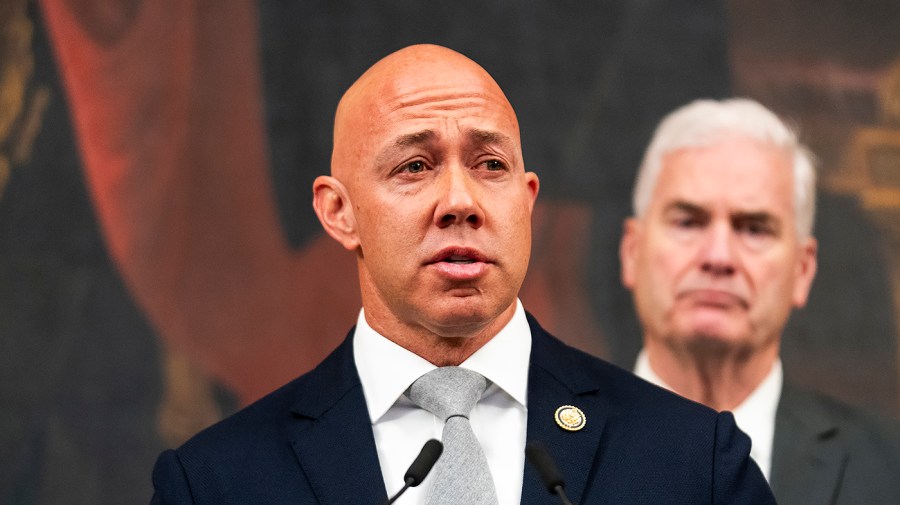Rep. Brian Mast (R-Fla.), the chair of the House Foreign Affairs Committee, told The Hill on Thursday that he will support the repeal of sweeping sanctions on Syria but wants language that would impose penalties if the interim government in Damascus fails to meet certain conditions.
President Trump is backing the repeal of the sanctions, and the House and Senate are in intense negotiations to shore up the draft of the National Defense Authorization Act (NDAA) by the end of Friday, with the aim of holding a vote on repealing sanctions the first week of December.
Mast told The Hill his position is not going against the Trump administration, which supports full repeal. Trump only has the power to waive sanctions six months at a time.
“Fully repealed, to have mechanisms, or rather a sentiment that sanctions should be reinstituted if a number of conditions are not met,” he said. “Still fully repealed.”
Mast is walking a fine line in giving a green light to remove all-encompassing sanctions on Syria, called the Caesar Syria Civilian Protection Act, as part of the NDAA.
His calls for unnamed “conditions” that must be met by Syria to avoid new sanctions is likely to receive pushback from repeal supporters who say any threat of sanctions reimposition will have a negative impact on Syria’s reconstruction and rehabilitation.
Mast, who has emerged as one of the main opponents to fully repealing the sanctions, said he is in conversations “back and forth daily” with the White House.
Trump, Syria’s transitional President Ahmed al-Sharaa, allies in Congress and civil society activists have pushed for full repeal of the sanctions in the months since al-Sharaa succeeded in overthrowing the regime of Bashar Assad in December.
“He’s a very strong leader. He comes from a very tough place. Tough guy. I like him,” Trump told reporters shortly after meeting with al-Sharaa on a historic trip to the White House earlier this month that was largely kept behind closed doors.
“I get along with the president, the new president in Syria, and we’ll do everything we can to make Syria successful,” Trump said at the time.
The sanctions regime is considered one of the most comprehensive pieces of legislation blocking financial transactions with Syria under the Assad government, and it punished countries for transacting with Damascus given the previous government’s human rights atrocities, mass killings and imprisonment of civilians.
Al-Sharaa won powerful allies in the region after ousting Assad.
“We did lift the sanctions [on Syria] at the request of the crown prince,” Trump said during the visit of Saudi Crown Prince Mohammed bin Salman to Washington earlier this week.
“Also the president of Turkey, [Recep Tayyip] Erdoğan, called me specifically. He said, ‘If you don’t lift the sanctions, Syria doesn’t have a chance. If you do, they have a very good chance.’ And between the two of them and some others, I lifted the sanctions, and the results so far have been pretty good.”
Without fully repealing the sanctions, Syria’s supporters say American businesses or countries allied with the U.S. would hold back investing in Syria over concern of running afoul of U.S. sanctions at a moment’s notice. Advocates also raised alarm that the Caesar sanctions have made it difficult to learn the fate of Americans disappeared in Syria.
But opponents of full repeal, or those calling for conditions to be laid out or risk sanctions, said al-Sharaa, a former designated terrorist, cannot fully be trusted to follow through on commitments to protection for minorities, counterterrorism and commitment to come to peace with Israel.
Copyright 2025 Nexstar Media, Inc. All rights reserved. This material may not be published, broadcast, rewritten, or redistributed.
For the latest news, weather, sports, and streaming video, head to The Hill.
